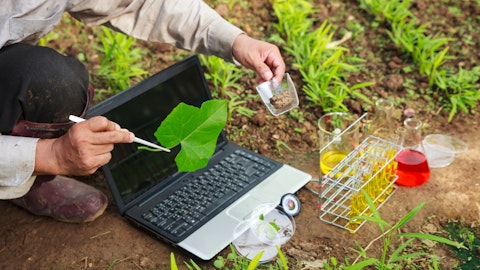That disconnect between supply and demand has happened to that industry in a massive way. We have heard estimates that fish oil prices, which used to be $2,000 a ton are $9,000 a ton. And by the way, if you want to use algo systems to produce this, to make 20,000 tons, you have to invest $200 million if you get the Veramaris investment that went into the facility in Blair, Nebraska. So, when you look at the two things, they are obviously quite different. It’s something for same technology, the same herbicide technology, the same Camelina. The difference is the omega-3 has been further modified to make this much higher value oil, and the market demand there is literally off the charts. So, very different, they are all based on the same technology, based on all of the investment we have made in new varieties in herbicide tolerance, and the partnership with Rothamsted.
The difference being, we announced we are executing the exclusive option and within a few weeks, we have got an agreement in place with BioMar. And I can tell you that we have had a lot of interest from a number of others. So, it’s just a different dynamic because that industry knows they need us here. We have to solve the problem. And so they are moving faster than the biofuel guys.
Noel Parks: Got it. Thank you. And just one last thing, kind of touches on what you were just talking about. As you look ahead to the need to build inventory to support grower contracts, I am just thinking, is that – does that imply any capital investment on your part down the road? And if so, is that a particular timeframe or can you sort of use leased facilities, equipment, etcetera, to handle that?
Oliver Peoples: Yes. So, in terms of that, I mean, really, the issue is at some point, it will be a question of working capital associated with our planting seed inventory. That’s what it’s going to be. I mean would be it. But of course, the whole idea that we have with this value chain is to have off-take for the product, the oil and the meal lined up ahead of time. So, essentially when we took the transfer of the grain from the grower to the processing facility or to the storage facility, they get paid and we get paid and we pay them. So, it’s going to be done fairly seamlessly. That’s what we have basically been doing with the rigor we have in Western Canada. And ultimately, as it goes, the business may likely evolve into different business models for sure, as it gets big.
Noel Parks: Great. Thanks a lot.
Lynne Brum: Okay, Noel, thank you for your questions. They were great. And I think, Oliver, I will turn the call back to you for closing remarks.
Oliver Peoples: So, I would like to personally thank all of you for joining us on the call tonight, and especially our shareholders for your continued support. And I would like to thank everybody at Yield10 for contributions that are keeping us on track to reach our commercial and product development goals. Have a nice evening.
Operator: Thank you everyone for joining. You may now disconnect – my apologies. Go ahead.
Lynne Brum: That’s fine. That’s it. We are going to disconnect now, Noel. Thank you.
Follow Yield10 Bioscience Inc. (NASDAQ:YTEN)
Follow Yield10 Bioscience Inc. (NASDAQ:YTEN)
Receive real-time insider trading and news alerts



